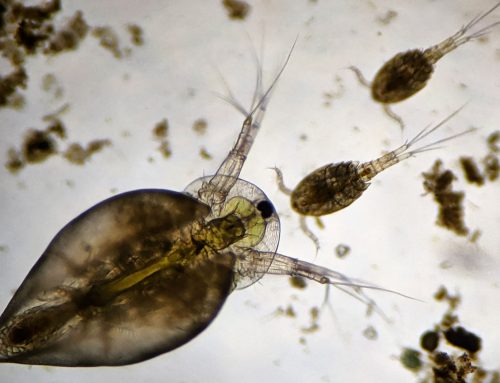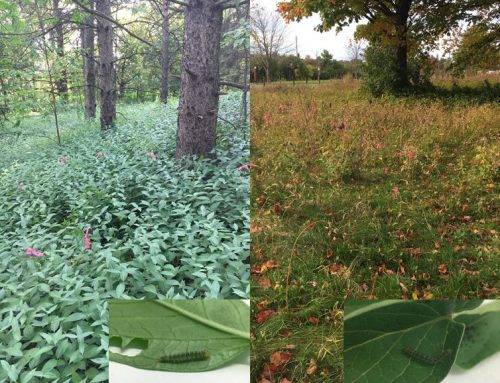by Sandy Garland
Tuesday-in-the-woods day and my trusty crew of Catrina, Mirko, and Kate arrived right on time. Unfortunately, it looked like rain, so we stayed around the centre for a while watering (the plants that don’t get rained on) and potting up more seedlings: Gray Goldenrod and Upland White Goldenrod.
As the sky cleared a bit, we sharpened the scythes and set off for the field north of the woods to do battle with dog-strangling vine (DSV). This week, DSV was over two feet tall and mostly blooming. (Remember, the goal is not to let it set seed.)
We worked around the damp Red Osier Dogwood/Tamarack field, cutting around large clumps of goldenrod and along the narrow grassy area between the shrubs and the road (photo above). We’ve found that goldenrod competes with DSV somewhat, so we try to give this native species an advantage by damaging its competition (photo below).

Catrina scythed DSV around these clumps of goldenrods, while I pulled any DSV plants left at the edges and the few plants in the middle.

Tiny milkweed sprouts; hopefully we’ll have a field full by the time Monarch butterflies arrive later this month.
In the milkweed field (still north of the woods but east of the centre trail), we again cut DSV along the road. In that field, a group of amazing high school students dug up a large area of DSV several weeks ago and planted Common Milkweed seeds, which are now sprouting. They turned the turf upside down on top of more DSV to double the damage and put down a tarpaulin south of the milkweed patch, in hopes of killing DSV there as well.
Questions we hope to answer
How many times do we have to cut DSV in various areas to keep it from setting seed? Will grass grow back faster than DSV, shading it and making it weaker? How effective is digging up the layer of sod that contains DSV roots? How effective is it to put down a thick layer of mulch after cutting DSV – a possible solution around shrubs?
Names of plants
The woods are looking very lush this week as spring wildflowers take their turn adding splashes of colour to the shades of green. False Solomon’s Seal is still in bloom, as are wild Red Columbines and persistent pink ones that arrived many years ago in someone’s fall leaves.
Interesting sightings
Dozens of Red Admiral caterpillars are eating their way through the nettles in the woods (below left). And Mirko found this tiny (2 cm diameter) mushroom growing in some mouldy wood chips (right).
- Red Admiral caterpillars
- Tiny mushroom, unknown species












Leave A Comment